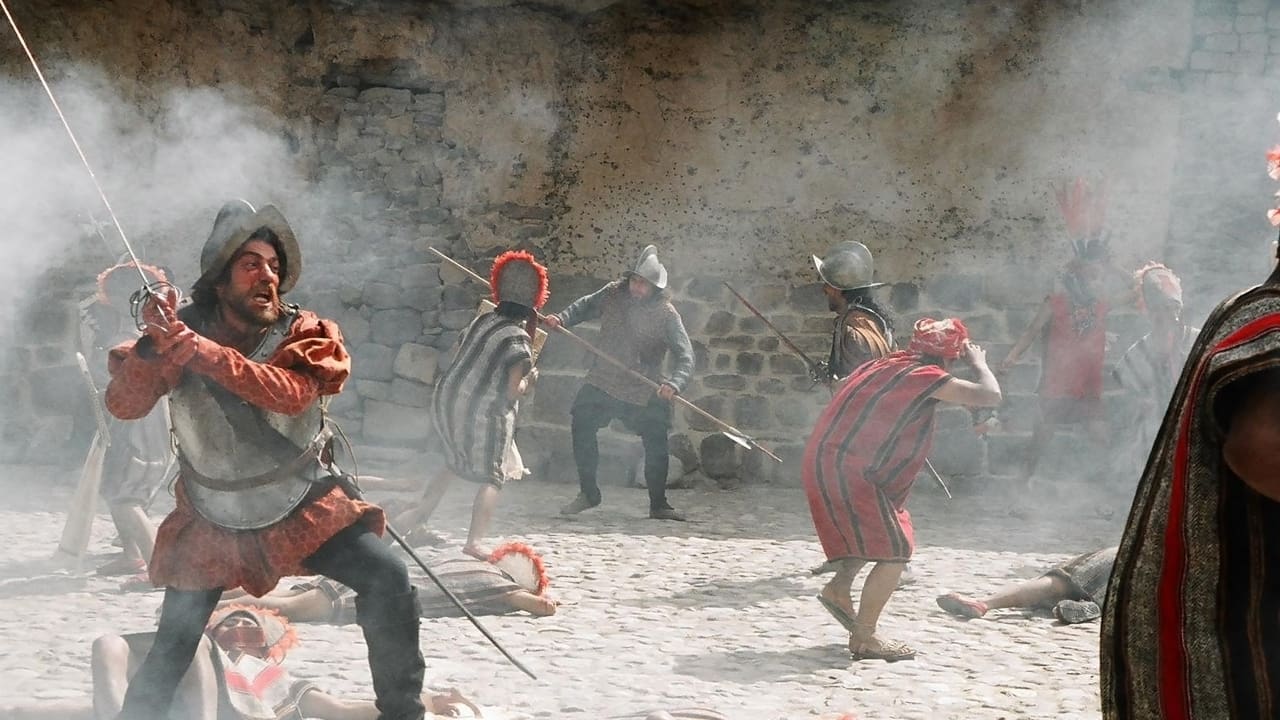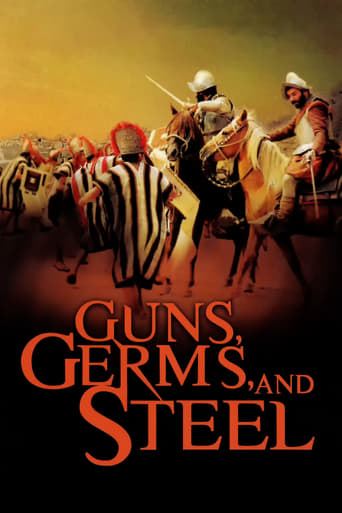

The Documentary, Guns Germs and Steel is an informational and argumentative documentary about Jared Diamond's theory on why there is a big difference between those who have advanced technology and those who live normally focusing more on gathering food instead of improving technology. I personally recommend this documentary to both Adults and Teenagers as it became one of my favourite documentaries because of the information it provides, and the reasons why and how the Europeans settled in South Africa.I have read the other reviews on the site and I agree with some of them. This information could have been presented in less than 2 hours, but there were some useless scenes like the time when Jared failed to shoot the arrow from the bow. I recommend Jared Diamond try to not overcome his sad feelings because he looked kind of strange when he was weeping and crying. Other than that, this documentary gives full explanatory reasons of the topic and is easy to understand.
... View MoreThis series asks the question: why do Westerners have so much materially and the natives of New Guinea have so little?Jared Diamond's thesis in Guns, Germs and Steel is that because Europeans had geographical conditions which were favorable to farming and domesticating animals they had natural advantages which allowed them to develop a high degree of civilization and conquer the world. I usually enjoy these video documentaries though I know that I'm getting watered-down history with great visuals. But 'Guns, Germs & Steel' is too weak an idea to carry through more than one episode, let alone three. I was willing to buy his notion that access to domesticating animals allowed for more productive farming and therefore greater civilizational advances. But he fails to explain why other civilizations that had those same advantages, for example China, India, the Middle East, didn't develop the science and technology that allowed Europe to dominate the world. The final episode is about Africa and shows that traditional African culture had many of the same advantages that Europeans had: domesticated animals, immunity to common diseases and efficient farming, yet never developed a higher level of technology. He becomes openly emotional about the current poverty of Africans while failing to explain why other cultures, like India and much of Asia, though formerly colonized, have now managed to advance scientifically and socially while much of Africa remains in misery and backwardness.Diamond likes to refer to the "greed" and "aggressiveness" of European colonizing powers, but isn't everybody "greedy?" How did the Incas (which he uses to illustrate his point) gain a huge empire and amass all that treasure? The Incas had 80,000 men under arms, so they weren't exactly a peaceful people. Farther to the north the Aztecs were not just warlike, but bloodthirsty in the extreme. How did they so easily succumb to the relatively few Spanish invaders? Now that is an interesting question which Diamond touches on in passing but then drops for the rest of the series. He seems to be saying that Western success is merely the result of evil impulses like greed and desire to conquer. This fits the politically correct narrative about the 'evil' West and 'innocent' natives. Unfortunately he can't express this idea openly because it's too simplistic and fails to account for reality.The answer to that question is, at least in part, provided by Victor Davis Hanson's book "Carnage and Culture" where he demonstrates how Western armies often won the day when outnumbered by virtue of superior military discipline. By the end of the three part series his thesis dissolves in contradictions and tediously repeated visual images. The first episode is interesting if a bit elementary, the other 2 are depressing and hollow. He fails to explain, or even attempt to explain, how it was that the scientific and industrial revolutions happened in Europe and nowhere else.
... View MoreI came to this with great expectations as a long-time admirer of Jared Diamond and his books, including 'Guns, Germs and Steel'. It was shown on UK TV as a 2+ hour documentary but it was painfully obvious that it originated as a 30-minute series. The result was that every half-hour or so the continuity was punctured by long and tedious repetitions of what had gone before - a real spoiler! The main themes of the book came across clearly and it was good to see Jared Diamond's personal first-hand responses to world events that he had previously only studied from a distance as an academic. But overall the programme was unbalanced, with far too much time devoted to Pizarro and the conquest of Peru (in the book only 15 pages out of 450) and nothing at all to his chapters on China and Polynesia.Yes, I know that I was expecting too much and it was great to see such important ideas about "a short history of everybody for the last 300 years" (his subtitle) popularised via television. But by the end I felt that it could have been so much better.
... View MoreHaving read Diamond's book, I was slightly disappointed in the series, but all in all, it is quite informative. Reading the other comments, it is comforting to know that the 'culture warriors' are hard at work, seeing 'attacks' on 'Western Civilization' under every rug.Is Diamond a little preachy ? Sure. Like a lot of academics, he sees his theory as the most important thing ever. He uses the phrase 'guns, germs, and steel' at seemingly every opportunity during the series. We get it, after about the first 10 minutes.Is Diamond a little simplistic (in the series) ? Sure. The part about the Spaniards in South America is particularly amusing, condensing some very long, complicated history down to 'smallpox, swords, and horses', wrapping up the whole conquest of South America in about 15 minutes. But the point remains valid - these things did in fact contribute (but not totally define) the reasons for the Spaniard's success against the established cultures.Is he preaching *against* Western Civilization in any way ? Nope. Not a word. Not to my ear. All he says is that luck played a large part in determining which cultures advanced more quickly, *not* that luck is the only reason.In the end, if you're looking for something that validates your own sense of superiority, then this series is not for you. But if you are interested in all of the factors than influence how societies succeed or fail, this series presents a useful interpretation of the historical evidence.
... View More